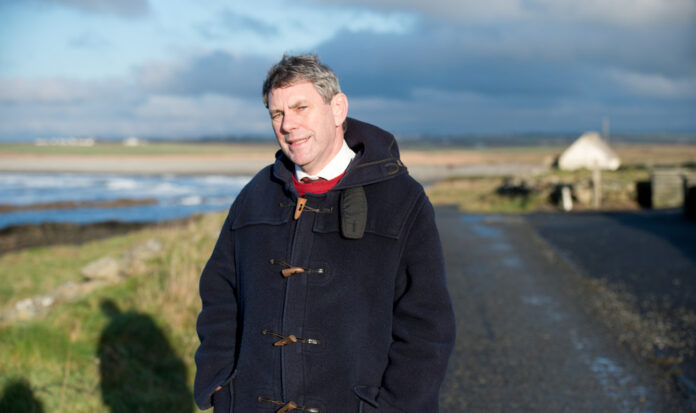CLARE went for weeks at a time without any confirmed Covid-19 cases earlier in the summer, but the numbers for the county jumped from 380 to 399 between July 30 and August 4.
As it stands now Clare is the county with the second highest number of infections (335.8) per 100,000 persons in Munster, behind Tipperary, where the figure per 100,000 of population is 341.6. The figure for Galway is just 193.0.
Speaking to the Clare Champion on Tuesday, West Clare GP and former TD Michael Harty said there were bound to be more cases of Covid-19 as restrictions were relaxed. “As restrictions ease obviously there’s going to be a resurgence of the virus, that’s been repeated elsewhere and there’s no reason to think Clare will be any different to anywhere else.”
Last weekend saw footage emerge of huge numbers of people completely disregarding precautions in Kilkee and Dr Harty said that if guidance isn’t followed there will be consequences. “The level of social distancing has broken down substantially in many of those (tourist) locations so that’s an opportunity for the virus to spread because the virus has the capacity to seek the path of least resistance and when people stop observing social distancing, the hand hygiene measures and not wearing masks, obviously the virus is going to resurge. Is it a second wave? It’s hard to know but certainly it isn’t entirely unexpected that having gone the best part of four weeks without a case (in Clare) once people started moving around and losing their fear of the virus it re-emerges. I think that’s going to be the pattern throughout this autumn and winter.”
He said that while it hasn’t resulted in many people being hospitalised, that could change in time. “The first wave really hit the elderly population, those who were in residential care and in nursing homes. This pattern seems to be a much younger group, the average age seems to be down around 33 whereas in the first wave the average age was significantly older. But there’s no guarantee that people of a younger age group aren’t going to end up seriously ill as well, inevitably some people will, but it may not result in the same numbers ending up in hospital. You couldn’t say that for sure, but the younger the age group the less likely there will be a big surge in hospital admissions although as winter progresses that could change.”
In the past people who have had some minor illnesses have just struggled with them for a few days, not missing work at all. However Dr Harty said that kind of approach will not be possible this winter, meaning major disruption to the economy. “We all have viral illnesses during the winter, we cough and sneeze, we go to work and we manage to get through it. This autumn and winter anyone that has a viral infection will be suspected of having Covid-19 until proven otherwise and that’s going to have a huge knock on effect on how people function. The advice will be to self isolate, go for a test and not return to work for at least 48 hours after you’ve no symptoms. Of course if you have the virus you’re going to be out for two weeks and whatever number of days after you’re symptom free. It’s going to be very difficult to distinguish between what’s real and what isn’t in relation to Covid as the autumn and winter comes.”
Using his own example to illustrate the point, he said, “If you’re a single handed GP and you have a viral illness or a fever or a cough, you’re going to have to self isolate until you get a Covid test. If it’s negative you have to self isolate till your symptoms are gone, if it’s positive you’re out for two weeks and hopefully don’t get too sick. That takes your secretary, your nurse and anyone else who works in the building out with you.”
He said that small rural pubs could probably have been re-opened relatively safely, if guidelines and time limits were to be followed and he said he had “great sympathy” for those that have to remain shut.
Rather than rolling back restrictions due to recent increases in case numbers, he feels the public need to redouble their efforts. “What really needs to happen is for people to cop on and be more vigilant. People have let their guard down, as you walk around town and go into shops there are a lot of people not wearing masks, a lot of people not taking basic precautions. If you go back to the basics of social distancing, wearing a mask in an enclosed area, washing your hands, cough etiquette, not going into congested areas, not spending a few hours in a pub or restaurant, they are all very important things to do. I think if people did those, it would give people the opportunity to go out and mix in a careful way.”
While a certain amount of complacency had set in about Covid, he says people are beginning to take it very seriously once again. “It lessened for a couple of weeks, during June and July anxiety levels started to reduce as things started to open up. Now, as the numbers are beginning to creep up again, people are getting anxious. There was a difficulty in convincing people that they needed to go for a test over the last number of weeks, and people were presenting having been symptomatic for a few days and they should really have come earlier, but they didn’t want the inconvenience of being isolated and having to go for a test. But I think now people are beginning to realise that they need to do this.”
There is no chance of what was normal returning in the short term, he says, so people need to take the precautions asked of them. “I don’t think we’re going to get back to pre-Covid behaviour in the next year, not before a vaccine comes out. The reality is there isn’t going to be a world wide distribution of a vaccine inside the next year. I think you’re looking at two years, going back to what we would call normal behaviour isn’t on the cards, but at the same time you can’t stay locked down forever, so people have to trade off inconvenience with getting some freedom back.”
Owen Ryan
Owen Ryan has been a journalist with the Clare Champion since 2007, having previously worked with a number of other publications in Limerick, Cork and Galway. His first book will be published in December 2024.




